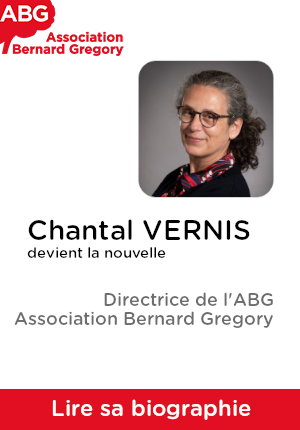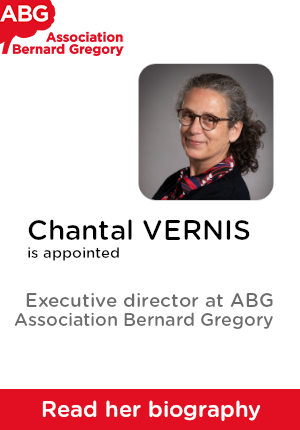How I defined my career plan step by step
Interview by Bérénice Kimpe (Head of International Department)
Defining your career plan is never easy. It takes time, requires a lot of introspection and network. Here is the testimonial of a doctorate holder who went through different steps and many questions before finding her way.

I used to be a typical academic: someone who only knows academia and wants to consider nothing but an academic career. A PhD thesis, a first postdoctoral fellowship in the United States, a second one back in France, an oral exam at the selection process for a tenured research position (CR2) and then nothing. Even though I am passionate about science, I have always had the feeling in my heart that my place was not in a laboratory. But since I didn't know which profession to choose, I kept doing what I knew how to do and I was left to do a series of postdocs. A "no choice". Except that over the years, it became more and more difficult for me to pretend to be a passionate scientist. It was becoming very expensive in terms of energy and I finally admitted that I could no longer afford postdoctoral fellowships, the bench, or academic research in general.
I made various attempts to find my way: going to seminars or conferences, meeting guidance counsellors, APEC (French Association for the Employment of Managers), Pole Emploi (French Employment Agency) and registering to a mentoring program. I finally understood that there was another way to say what I could do: "project management", "management"... But I still didn't see what good it would do to me because I didn't know what job to turn to. I was told about “enseignant-chercheur” (first permanent position at French universities): I don't like teaching but there are also research activities in this position. Industry was another sphere, a world apart from which I understood nothing and which I rejected on principle. I had a very dichotomous and romantic vision, with an extreme tendency: on the one hand, the disinterested academic researcher who worked for Science and Knowledge; on the other hand, the shameless industrialist who would do anything for profit.
In 2015, I had two great opportunities. First of all, my husband obtained a position in the territorial civil service, 1200 km from my place of residence. Having no follow-up to my postdoc, I decided to follow him, as he had done before. Then there was the first session of the Cross-border Postdoctoriales*. The CR2 competition was my last attempt for an academic career. I was determined not to do a postdoc again: this time, I was up against the wall, with unemployment in front of me. I couldn't run away anymore.

The Cross-border Postdoctoriales was a four-day closed-session that changed my route. It was not at all what I expected: it was much better. In an atmosphere of kindness, openness, listening and non-judgement, we were led to know what was important to us, what our values were, what we did or did not like in our professional activities. I thought I would receive a checklist, with career options based on degrees, but it would have been pointless in reality, since the goal was to know not what we could do, but what we wanted to do, deep down. Being away from your daily life is essential because it allows you to refocus on yourself. It allows you to remove social strata. No more "I have to do this because my parents think this or that, because my friends do it, because in my system of beliefs I am such and such a person".
Back home, I opened the hatches: two weeks later, I was told of a postdoctoral fellow who had stopped research and was doing scientific illustration. I was turned around. It was obvious, that's what I had to do! I had actually hesitated between Fine Arts and Science. Passionate about computer graphics, I was particularly happy during my thesis and postdocs when it came to making posters, diagrams, graphics, illustrations. So much so that at the end of the postdoctoral period, I only did experiments to be able to make diagrams of them!

So I used my 2 years of unemployment to start my scientific illustration business. I did it in an activity cooperative www.coopetic.com to avoid throwing myself into the deep end right away. It is a kind of wage bearing with significant support. The cooperative lends its SIRET number to the project leader, takes care of its accounting, gives him a salary on the basis of the turnover he makes, trains him in entrepreneurship (marketing, accounting, planning...).
It also means that you are not alone at home moping around when you feel low. I networked, made friends, had fun. I worked a little bit. Not enough. I know why, but I have no intention of changing anything: I did exactly what I wanted, as I wanted. If it doesn't work, then I'll do some illustration in parallel of another job.
So back to square one: what job?
I went back to the Postdoctoriales documents, I thought about my discussions with my thesis supervisor, who told me that in industry, the researcher supervises technicians who do the experiments, that there are means and that we do not go on forever if the subject does not work. At that moment, I couldn’t be close to a pipette any longer and the idea of going back there became unbearable to me.
I experienced experimental failure on a daily basis no longer as a step towards success but just as a punishment. But I missed teamwork and the process of reflection. That's when I thought maybe I should consider R&D.
I came across an advertisement for a position offered by a small company in my region. I thought I would never find a company whose values were aligned with mine, but I was wrong. At the second interview, the consultant from the recruitment firm asked me to talk about my values. She immediately felt that I could fit the company's profile. These same values that I discussed at length during the last meeting with the President and Director apparently tipped the balance in my favour. They actually compensated for the lack of R&D experience and even for the lack of knowledge in business. So I was offered the position subject to training, which I was quick to accept.
Finally, in this position of R&D manager, I only do what I like in science: no more experiments, no more endless projects doomed to failure, but concrete applications, means and above all, I believe in what I do. That's a thousand miles from what I thought when I started the research.
Testimony of a person who wishes to remain anonymous
*Cross-border Postdoctoriales have been organized by ABG since 2015 in partnership with the French-German University, the Luxembourg Agency for Research FNR and Luxembourg research organizations (LIH, LIST and the University of Luxembourg). The objective is to support postdoctoral researchers in their transition outside the academic sector by enabling them to assess their skills and career plans, consider new career opportunities and communicate effectively with recruiters.
Crédits photographie en-tête :
Jeff Sheldon @ugmonk www.unsplash.com
Find out more
Crossborder Postdoctoriales 2018: highlights!
The 4th edition of Crossborder Postdoctoriales took place in Luxembourg city from 4 to 7 December 2018. This event is designed for researchers from all fields employed on temporary contract in the public sector or seeking employment. Here are the highlights!
The Cross-border Postdoctoriales are back!
For the 4th year in a row, ABG and its partners organize a new edition of Cross-border Postdoctoriales. This career workshop is dedicated to postdocs and unemployed doctorate holders. On your marks? Ready? Apply!
Get ABG’s monthly newsletters including news, job offers, grants & fellowships and a selection of relevant events…
Discover our members
 MabDesign
MabDesign  Nokia Bell Labs France
Nokia Bell Labs France  PhDOOC
PhDOOC  Généthon
Généthon  Institut Sup'biotech de Paris
Institut Sup'biotech de Paris  Ifremer
Ifremer  Laboratoire National de Métrologie et d'Essais - LNE
Laboratoire National de Métrologie et d'Essais - LNE  CASDEN
CASDEN  Groupe AFNOR - Association française de normalisation
Groupe AFNOR - Association française de normalisation  MabDesign
MabDesign  ANRT
ANRT  SUEZ
SUEZ  Tecknowmetrix
Tecknowmetrix  TotalEnergies
TotalEnergies  CESI
CESI  ADEME
ADEME  ASNR - Autorité de sûreté nucléaire et de radioprotection - Siège
ASNR - Autorité de sûreté nucléaire et de radioprotection - Siège  Aérocentre, Pôle d'excellence régional
Aérocentre, Pôle d'excellence régional  ONERA - The French Aerospace Lab
ONERA - The French Aerospace Lab







